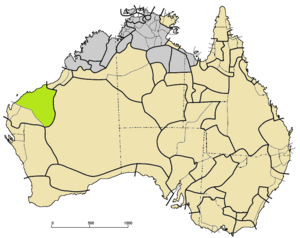Ngayarda languages facts for kids
Quick facts for kids Ngayarda |
|
|---|---|
| Geographic distribution: |
Western Australia |
| Linguistic classification: | Pama–Nyungan
|
| Subdivisions: |
—
|
 Ngayarda languages (green) among other Pama–Nyungan (tan)
|
|
The Ngayarda languages are a group of languages spoken in the Pilbara region of Western Australia. These languages are very similar to each other. They are part of a much larger group called the Pama–Nyungan family, which covers most of Australia.
The name Ngayarda comes from the word for "man" in many of these languages. This shows how closely related they are.
Contents
What Are Ngayarda Languages?
There are several languages that belong to the Ngayarda group. Experts like Bowern & Koch (2004) have identified these languages:
- Martuthunira
- Ngarluma-Kariyarra
- Yindjibarndi–Kurrama
- Panyjima
- Jurruru
- Nyamal
- Yinhawangka
- Ngarla
- Nhuwala
- Palyku
How Languages Are Grouped
Sometimes it's hard to be sure if a language belongs to a group. For example, some experts weren't sure about Yinhawangka, Nhuwala, and Ngarla at first. But now, most agree they are part of the Ngayarda family.
Also, some languages like Yindjibarndi-Kurrama and Ngarluma-Kariyarra are so similar they might be considered different versions of the same language. However, the people who speak them often see them as separate languages. Palyku is also a bit different from the others.
Special Grammar Rules
The Ngayarda languages share some special grammar rules that help experts group them together. These rules are like secret codes that show they are related.
For example, in many Ngayarda languages, you can change how a sentence sounds to show who is doing the action. This is called an active or passive voice.
Also, some old grammar endings from the very first Pama-Nyungan language changed their meaning in Ngayarda languages. For instance, an ending that used to mean "indirect object" (like "to him") now means "object" more generally. Another ending that used to mean "future" (like "will do") now means "present" (like "is doing"). These small changes help linguists understand how languages evolve.
Past Ideas About Classification
An expert named C.G. von Brandenstein once tried to divide the Ngayarda group into "Coastal Ngayarda" and "Inland Ngayarda." However, this idea is no longer considered correct by most language experts. Some older maps of Australian languages still show this old classification, which can be confusing.
See also
 In Spanish: Lenguas ngayarda para niños
In Spanish: Lenguas ngayarda para niños
 | Delilah Pierce |
 | Gordon Parks |
 | Augusta Savage |
 | Charles Ethan Porter |

